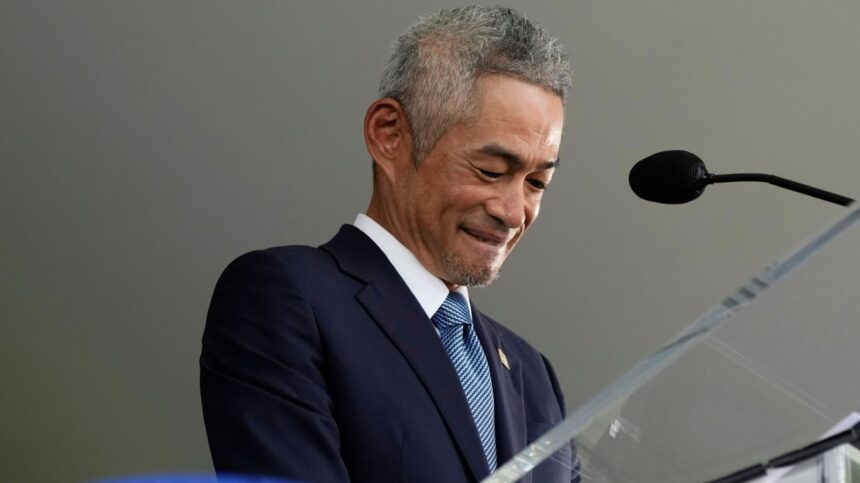Ichiro Suzuki Headlines Baseball Hall of Fame Class
Cooperstown, N.Y. – Ichiro Suzuki made history by becoming the first Japan-born player to be inducted into the Baseball Hall of Fame on Sunday, marking a milestone in the prestigious institution. The ceremony featured the participation of four new members, solidifying their legacies in the sport. After a delay due to a rain interruption, the honorees’ speeches took place without a hitch. The atmosphere became warm and humid, conducive to the celebration. Alongside Suzuki, pitchers CC Sabathia and Billy Wagner, and hitters Dick Allen and Dave Parker, both posthumously inducted, were honored.The American public had the opportunity to get to know Suzuki’s funnier side. His teammates always highlighted his sense of humor, something that was rarely seen in public, but became evident on Sunday. When the Hall of Fame voting results were announced, Suzuki was one vote away from being the second unanimous choice. He thanked the journalists for their support, with one exception.“For the third time, I am a rookie,” Suzuki expressed, using English in his comments, despite his habit of using Japanese in his public appearances with an interpreter.
Ichiro Suzuki
After the laughter, Suzuki remembered the kind comments he made when the voting results were announced, offering to take the journalist who didn’t vote for him out to dinner to learn their reasons. However, it was already too late. “The offer to the journalist to have dinner at my house has expired!” Suzuki joked. Suzuki’s dedication to detail and his unparalleled work ethic have endured to this day, more than five years after his last game in the Major Leagues. This was the central message of his speech, aside from his jokes.“Three thousand hits or 262 hits in a season are achievements recognized by journalists,” Suzuki commented. “Except, oh, one of you.”
Ichiro Suzuki
After being one of the biggest stars in Japanese baseball, with a .353 average over nine seasons with the Orix BlueWave, Suzuki burst onto the scene as a 27-year-old rookie for the Seattle Mariners, batting .350 and winning the Rookie of the Year and American League MVP awards. The “Ichiro!” chants that echoed at Mariners games were heard again among the crowd. The all-time leader in hits in a season (262 in 2004) posed with his plaque alongside Commissioner Rob Manfred and Hall of Fame President Jane Forbes Clark. Despite his late MLB debut, Suzuki accumulated 3,089 hits in the majors and 4,367 including his time in Japan. Suzuki listed some of his achievements, such as his hit total and his 10 Gold Gloves. “It’s not bad,” he concluded. Sabathia’s weekend began with a minor setback when his wife’s car broke down shortly after the family left for Cooperstown. However, they arrived on time, and Sabathia was warmly received by numerous Yankees fans who made the trip. After debuting with Cleveland at age 20, Sabathia became a star with a rookie season of 17-5. Unfortunately, that happened in 2001, the same year Suzuki came to the American League.“If you consistently do the small things, there is no limit to what you can achieve,” Suzuki stated. “Look at me. I’m 5-11 and weigh 170 pounds. When I came to the United States, many said I was too thin to compete with the big leaguers.”
Ichiro Suzuki
Sabathia focused most of his comments on the support he has received over the years from his friends and family, especially from his wife, Amber.“Thanks above all to the great players who are sitting behind me,” Sabathia said. “I am very proud and honored to join you as a member of the Hall of Fame, including Ichiro, who stole the Rookie of the Year award from me in 2001.”
CC Sabathia
Parker, 74, died from complications of Parkinson’s disease on June 28, less than a month before the induction ceremony. His son, Dave Parker II, represented him on the stage, and although the moment was bittersweet, it was not somber. Parker II concluded the speech with a moving poem written by his father that, for a few minutes, made it feel as if the player nicknamed “The Cobra” was present.“The first time we met was at a party at the university,” Sabathia recalled. “We spent the whole night talking, and that conversation has lasted 29 years.”
CC Sabathia
Parker finished with 2,712 hits and 339 home runs, won two Gold Gloves thanks to his legendary right arm, and was named National League MVP in 1978. He spent his first 11 seasons with the Pittsburgh Pirates and entered the Hall representing the Bucs. Wagner, whose 422 career saves place him eighth on the all-time list, delivered an emotional but humorous speech about a small-town boy with a height of 5 feet 10 inches, short for a pitcher, who achieved success.“Thank you for being by my side,” Parker’s poem concluded. “I told you Cooperstown would be my last rap, so Dave’s star will be in the sky tonight. Watch it shine. But I didn’t lie in my documentary, I told you I wouldn’t show myself.”
Dave Parker
In one of those moments of baseball serendipity that only Cooperstown can offer, the television broadcast showed Bench, sitting a few meters from where Wagner was speaking. Allen’s widow, Willa, offered a moving tribute to her late husband, who passed away in 2020 after years of feeling ignored for his outstanding career. Allen, National League Rookie of the Year in 1964 with the Phillies, won the American League Most Valuable Player award in 1972 with the Chicago White Sox.“I feel like my life in baseball has come full circle,” Wagner expressed. “I was a fan before I could play. In an era when baseball wasn’t as available on television, every Saturday morning I watched Johnny Bench and many other greats on the show ‘The Baseball Bunch’.”
Billy Wagner
Willa focused on the more sensitive side of a player who in his time was perhaps unfairly characterized by a conflictive relationship with the media.“Baseball was his first love,” Willa said. “He used to say, ‘I would have played for free,’ and I think he meant it. But, of course, if you compare today’s salary, he played almost for free.”
Willa Allen
“He was devoted to people, not just the fans, but especially his teammates,” Willa commented. “If he found out someone was sick or going through a hard time, he would turn to me and say, ‘Willa, they need to hear from us.'”
Willa Allen










